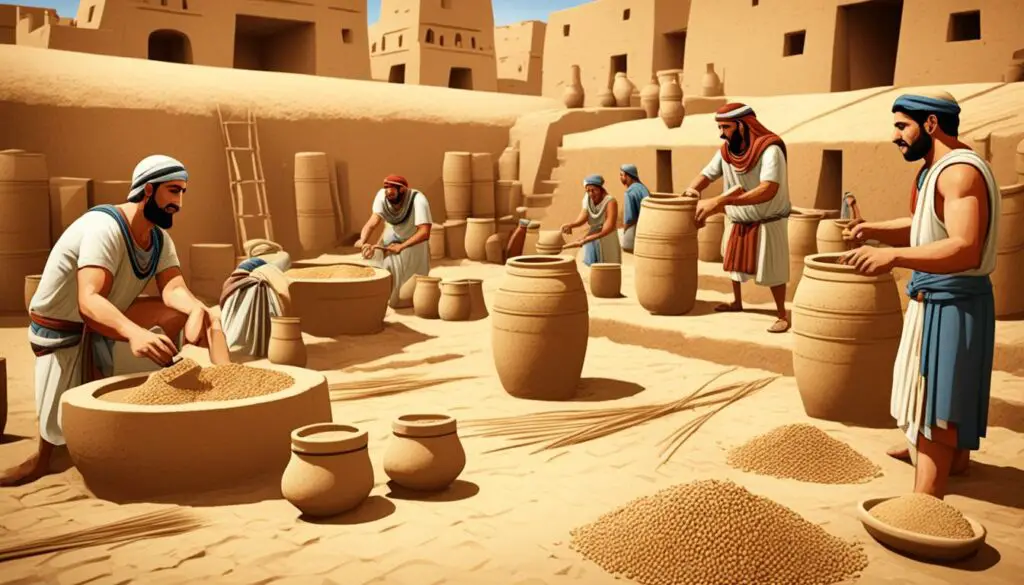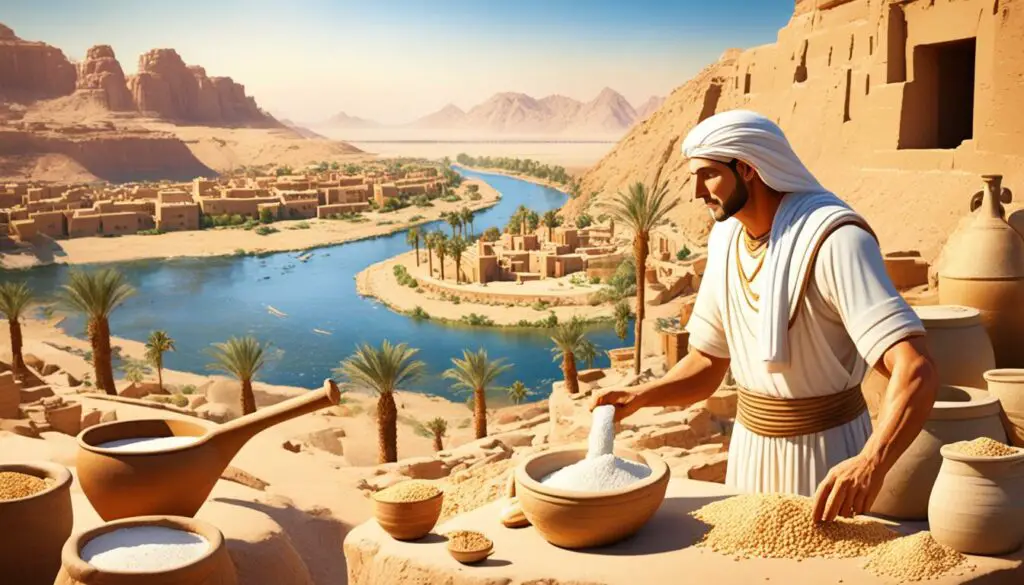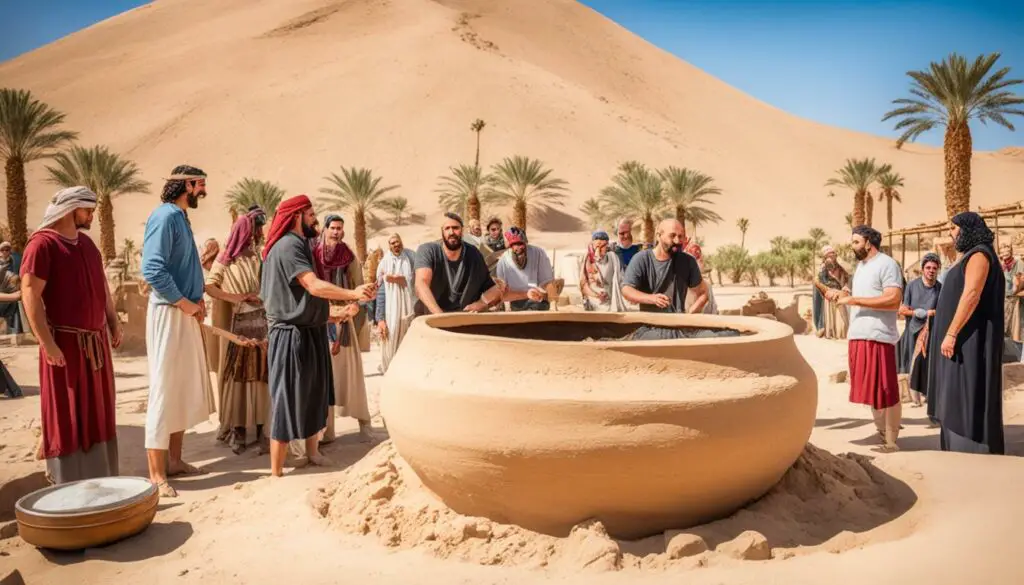Did you know that beer was not only a popular beverage in ancient Egypt but also a significant part of their culture and society? The brewing of beer was a well-established practice, and it was consumed in large quantities by both the common people and those of higher social status. But what made beer so important to the ancient Egyptians? And how did they brew it?
In this article, we will explore the intriguing histories and traditions surrounding beer in ancient Egypt. Discover the significance of beer in their society, the unique brewing process they used, the ingredients they incorporated, and the rituals and occasions during which beer was enjoyed. We will also compare ancient Egyptian beer to the modern brews we know today.
Join us on a journey back in time as we uncover the secrets of ancient Egypt’s beer and explore the fascinating role it played in their civilization.
The Significance of Beer in Ancient Egypt
Beer held immense cultural and societal significance in ancient Egypt. It was not merely a beverage, but a vital part of their daily lives. Beer was consumed by both the common people and laborers, forming an integral part of their diet. It was treated as a type of food, providing nourishment and refreshment. Additionally, beer played a significant role in religious festivals and celebrations. The ancient Egyptians believed that beer was a divine beverage, gifted to them by the gods.

The deities themselves were associated with beer, with Hathor being referred to as “The Lady of Drunkenness.” Beer was deeply ingrained in the traditions and rituals of ancient Egypt, forming a bridge between the mortal world and the divine. It was consumed in abundance during social gatherings and played a crucial role in fostering a sense of community. The production and consumption of beer were not only practical but also carried profound cultural and spiritual significance.
The Brewing Process in Ancient Egypt
The brewing process of beer in ancient Egypt was quite different from modern methods. In ancient Egyptian beer brewing, they used a two-stage mash, where a cold mash was combined with a hot mash. The cold mash was made using ambient temperature water and ground grain, while the hot mash consisted of unmalted grain mixed with hot water. The two mixtures were then combined and left to cool, allowing the enzymes to convert the starches in the grains into fermentable sugars. The resulting mixture was sieved and transferred to a terracotta fermenting vessel, where it would ferment. The absence of boiling in the brewing process led to the conversion of all starches into sugars, making the beer 100 percent efficient in alcohol production.

| Brewing Process in Ancient Egypt | Modern Brewing Process |
|---|---|
| A two-stage mash using a cold mash and a hot mash. | A single mixture of all grains processed together. |
| Conversion of starches into sugars without boiling. | Boiling involved for the extraction of hop bitterness. |
| Fermentation in terracotta fermenting vessels. | Fermentation in stainless steel vessels. |
| Emphasis on simplicity and efficiency. | Use of specific strains of brewer’s yeast. |
The brewing process in ancient Egypt showcased a unique approach to creating beer. The use of a two-stage mash and the absence of boiling resulted in a distinctive flavor profile and 100 percent efficient alcohol production. The ancient Egyptians’ innovative methods, combined with the natural fermentation vessel of terracotta, contributed to the creation of a refreshing and culturally significant beverage.
Ingredients in Ancient Egyptian Beer
Ancient Egyptian beer had unique ingredients that set it apart from modern brewing practices. Unlike modern beer, hops were not used in ancient Egypt. Instead, the primary grain used in ancient Egyptian beer brewing was emmer, which was the earliest precursor to modern wheat. Emmer was a popular choice due to its availability and ability to thrive in the Egyptian climate.
Ancient Egyptian brewers also experimented with different flavorings to create a diverse range of beer varieties. For special occasions, such as the brewing for the royal brewery, dates and other flavorings were added to produce a more luxurious and sweeter beer.
Additions for Luxurious and Sweeter Beer:
- Dates
- Other flavorings
Ancient Egyptian brewers also incorporated various spices to enhance the flavor and aroma of their beer. Some of the commonly used spices included rose petals, pistachios, sesame seeds, coriander, and cumin seeds. These added ingredients contributed to the unique and distinct taste of ancient Egyptian beer.
Spices Added for Flavor Enhancement:
- Rose petals
- Pistachios
- Sesame seeds
- Coriander
- Cumin seeds
The absence of hops, combined with the incorporation of dates, spices, and other flavorings, gave ancient Egyptian beer its own characteristic flavor profile. This ancient brew was vastly different from modern beer recipes, highlighting the creativity and ingenuity of brewers in ancient Egyptian culture.
Drinking Beer in Ancient Egypt
In ancient Egypt, beer was more than just a beverage – it was a vital part of daily life and culture. Not only adults but also children consumed beer as a source of nutrition, emphasizing its importance in their diet. Beer played a significant role in compensating workers, such as those involved in building the pyramids, who received a daily ration of beer as part of their wages.
Ancient Egyptians believed in the healing properties of beer and prescribed it in their medical texts. They attributed various health benefits to beer, considering it a remedy for different ailments. Beer was cherished and enjoyed in festive occasions and religious ceremonies, where it played a central role in celebrations. It was a common sight to witness people drinking beer from communal vessels, creating a sense of unity and camaraderie.

One intriguing aspect of consuming beer in ancient Egypt was the use of straws. People used reed or metal straws to drink beer and prevent the ingestion of sediment that settles at the bottom of the vessels. This practice ensured a more pleasant and refined drinking experience. It also highlights the meticulousness and attention to detail in ancient Egyptian culture.
The prevalence of beer in both everyday life and special occasions underlines its cultural significance in ancient Egypt. It served as a social lubricant, bringing people together and fostering a sense of community. Beer was a manifestation of their traditions and the deep-rooted belief that it was a divine gift from the gods.
The Role of Beer in Ancient Egyptian Society
- Beer was a staple in the daily diet and consumed by both adults and children for nutritional purposes.
- Compensating workers with beer was a common practice, including those involved in monumental constructions like the pyramids.
- Medical texts acknowledged the health benefits of beer and prescribed it as a remedy for various ailments.
- Beer was an integral part of festive occasions, religious ceremonies, and social gatherings.
- Drinking beer from communal vessels fostered a sense of unity and camaraderie.
- The use of straws enhanced the drinking experience and prevented sediment consumption.
Ancient Egyptian Beer Drinking Culture
| Aspect | Description |
|---|---|
| Dietary Importance | Consumed daily for nutrition, both children and adults included beer in their diet. |
| Compensation | Laborers received a daily ration of beer as part of their wages. |
| Health Benefits | Beer was prescribed in medical texts for its perceived healing properties. |
| Social Significance | Beer played a central role in festive occasions, religious ceremonies, and social gatherings. |
| Communal Drinking | Beer was shared from communal vessels, fostering a sense of unity and community. |
| Use of Straws | Reed or metal straws were used to prevent sediment consumption and enhance the drinking experience. |
Brewing Techniques and Vessels
In ancient Egypt, the brewing techniques and vessels used for beer production were significantly different from modern practices. The brewing vessels typically consisted of ceramic containers with a porous interior, allowing wild yeast cultures to develop and ferment the beer. The porous nature of these vessels also provided a cooling effect, which was advantageous in the hot arid climate of Egypt.
The brewing process involved mixing cooked loaves of bread with water to create a mash, which was then fermented in heated jars. This unique method resulted in a distinctive flavor profile for the ancient Egyptian beer. To drink the beer, straws were commonly used to prevent the malt from floating on the surface and to achieve a smoother drinking experience.
The choice of vessels and the use of straws were deliberate decisions made by ancient Egyptian brewers to enhance the brewing process and ensure a lighter and more refined beer. These vessels and straws played a crucial role in ancient Egyptian beer production, contributing to the distinct characteristics of their beer.

Ancient Egyptian Brewing Techniques:
- Mixing cooked bread with water to create a mash
- Fermenting the mixture in heated jars
- Utilizing porous ceramic vessels for fermentation
- Using straws for drinking beer
The combination of these ancient brewing techniques and the unique vessels used helped create the flavorful and refreshing ancient Egyptian beer.
Ancient Egyptian Beer vs. Modern Beer
Ancient Egyptian beer and modern beer differ in various aspects. In ancient Egypt, the brewing process did not involve boiling, resulting in all starches being converted into sugars and maximum alcohol production. The ancient Egyptians used traditional methods and ingredients to brew their beer, focusing on simplicity and efficiency. In contrast, modern beer brewing techniques involve a single mixture of all grains processed together within a narrow temperature window. Hops, which add bitterness and aroma, are a common ingredient in modern beer. Furthermore, modern brewing prioritizes the use of single-strain brewer’s yeast and stainless steel vessels.
Despite these differences, both ancient Egyptian beer and modern beer are beloved for their unique flavors and play essential roles in their respective societies. Ancient Egyptian beer, with its rich history and cultural significance, was not only a beverage but also a vital part of everyday life. It was consumed by people of all social classes, including children, and was associated with religious festivals and celebrations.
On the other hand, modern beer is a product of technological advancements and refined brewing techniques. It comes in various styles and flavors, catering to different tastes and preferences. While ancient Egyptian beer relied on natural fermentation processes and traditional ingredients, modern beer brewing techniques allow for greater control and consistency in flavor profiles.
In conclusion, ancient Egyptian beer and modern beer may differ in their brewing methods, ingredients, and cultural contexts. However, both have left a lasting impact on the world of beer, showcasing the enduring love and appreciation for this ancient and timeless beverage.
FAQ
Q: Was beer a common beverage in ancient Egypt?
A: Yes, beer was not only an everyday beverage but a vital part of their culture and society.
Q: What was the significance of beer in ancient Egypt?
A: Beer held immense cultural and societal significance in ancient Egypt. It was treated as a type of food and consumed daily by the common people and laborers. It was also an essential part of religious festivals and celebrations.
Q: How was beer brewed in ancient Egypt?
A: The brewing process in ancient Egypt involved a two-stage mash, where a cold mash and hot mash were combined. The mixture was left to cool, allowing the enzymes to convert the starches into fermentable sugars.
Q: What ingredients were used in ancient Egyptian beer?
A: The main grain used in ancient Egyptian beer was emmer, and they sometimes added dates and other flavorings such as rose petals and coriander. Hops were not used in ancient Egyptian beer brewing.
Q: Was beer consumed by everyone in ancient Egypt?
A: Yes, beer was not only consumed by adults but also by children as a source of nutrition. It was provided as a daily ration to workers such as those who built the pyramids.
Q: What were the brewing techniques and vessels used in ancient Egypt?
A: Ancient Egyptian brewers used ceramic vessels with a porous interior that allowed wild yeast cultures to grow. The brewing process involved mixing cooked loaves of bread with water and fermenting the mixture in heated jars.
Q: How does ancient Egyptian beer differ from modern beer?
A: Ancient Egyptian beer did not involve boiling, resulting in maximum alcohol production. The ingredients and brewing methods used in ancient Egypt were different from modern brewing practices. Hops, common in modern beer, were not used in ancient Egypt.

That was great. I am going to a lecture at our local Museum of History next week on the history of ancient beer. I had forgotten that they drank their beer through straws (reeds). And that they drank it as part of religious occasions — and the egyptians were VERY religious!